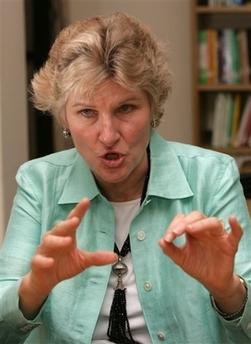Karen Hughes Wins Praise for Public Diplomacy Shake-Up
Karen Hughes is making huge strides in improving America’s public diplomacy, according to a page 15 story by WaPo’s Glenn Kessler.
Seven months ago, Undersecretary of State Karen P. Hughes began her job to improve the United States’ “public diplomacy” with an ill-fated splash — a “listening tour” of the Middle East that earned negative reviews from the Arab media and catcalls from domestic critics. But since that diplomatic debut, Hughes has managed to set in motion substantial changes in the ways an often lumbering government bureaucracy reacts to the swirl of news, gossip and rumors that make up today’s 24-hour news cycle.
[…]
Hughes’s efforts include such innovations as a presidential campaign-style “rapid response” unit that monitors Arabic newscasts and then distributes early-morning summaries. Previously, the government produced 14 disjointed reports, which came out 24 to 48 hours after news appeared overseas. By then the response was stale. Now, a team of people who speak Arabic and other languages monitors news reports by computer and on large flat-screen TVs, producing an instant report on the “hot issues” overseas and suggested messages to counter the bad news.
[…]
She has created new senior-level posts, placing a deputy assistant secretary responsible for public diplomacy in every regional bureau of the State Department. This gives her bureaucratic tentacles into the key offices of the building, where many policies are developed. She said “mistakes were made” when the old U.S. Information Agency was merged into the State Department seven years ago, creating her office but leaving few links with officers in the field. “One of the things we have tried to do is reestablish those management links,” she said.
This is quite a pleasant surprise. The punditocracy, myself included, were quite skeptical when Hughes was appointed to this post.
One wonders, however, whether a story about what a lousy job Hughes was doing would be buried on page A15 . . .





James, how did you come up with that? What are the metrics by which “public diplomacy” is judged to have “improved”?
All the article states are a bunch of bureaucratic shiftings and expansions done by Hughes.
The article has no results-based analysis. There is no attemt to explain or document what the effects of the programs have been.
Bhoe raised a good point, one that’s also raised by the American Foreign Service Association rep. in the WaPo article: metrics.
PD metrics are difficult to do. If a PD program creates doubt in the mind of someone who’s “anti-American” (itself a sliding scale), just how do you measure that? How do you count the article–or blog post–that that person didn’t write? And is that doubt “serious doubt” or just “paused a second before writing a critical article”? Both are important, of course, though standing at different points along some line of effectiveness.
Effectiveness is also a long-term goal. No one expects that a single piece of inspired prose will bring about the Kingdom of Heaven on Earth. But nibbling at the edges, if done long enough, gets to the core of things.
Exchange programs, for instance, may actually result in a visitor’s complete change of perspective. That’s great. Count “1 point” for effectiveness. Maybe that visitor, upon returning home, tells three friends, “Wow, it wasn’t at all what I expected! This sort of makes sense.” Is that “+3 points”? And what about 15 years down the road, when that visitor is now a university professor, a senior editor, a government minister? How do you measure the effectiveness of that visit?
There is some documented history that show that an exchange program has had a direct effect. Pik Botha, for instance, has publicly credited his visit to the US–on a USIA exchange program for parliamentarians–with changing his mind about the possibilities of Blacks and Whites living together in peace. Tony Blair credits at least part of his understanding of the US to a similar visit he undertook.
But the “metric” is measurable years, decades after the PD event.
Neither OMB nor the GSA are going to be happy with a “metric” that becomes visible only long after the political incumbents are out of office.
For some things, you have to go on gut instinct.
When I was Counselor for Public Affairs in Riyadh, in 2002, I thought it would be useful–and a good use of taxpayer dollars–to send Saudi clerics to the US to see how religion was taught in the US, in a manner that both instilled the individual religious educational institutions values and, simultaneously, did not demonize other religions.
I figured that there was little likelihood that the clerics would come back with a worse concept of the US than they left with. But there was a good chance that their eyes would be opened to several important things:
1) religion is important in the US
2) most religions in the US have their own religious institutions, independent of the state
3) it is possible to have various religions coexisting without warring among them
According to interviews with the participants on their return, the program succeeded on all three counts.
But what’s the “metric” here? That they said they were newly informed? Or is it that the tone of their sermons may change?
You tell me! I’m happy that the program “worked” even if I can’t tell you exactly how much it worked. I’m happy, too, that the program is now in its third year. Somebody else must agree that it’s worth the time, money, and effort.
BTW, I was always confident that Hughes’ access would be a critical factor of whether or not her stewardship was successful or not. It’s not just enough to have good ideas or to be super-brainy. Without the access, nothing happens.